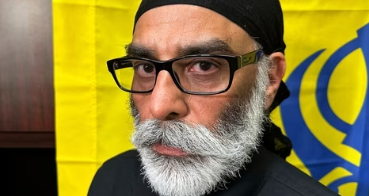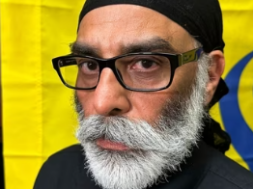
Pannun Murder Plot Accused Nikhil Gupta Seeks Indian Government Intervention
Manas Dasgupta
NEW DELHI, Dec 15: Nikhil Gupta, the Indian accused of plotting to hire hitman to kill the United States-Canadian citizen Gurpatwant Singh Pannun on the American soil, currently being held in a prison in Czech Republic waiting for extradition, has approached the Supreme Court through a relative in India seeking Indian government’s intervention in his extradition to the US.
Even as the bench headed by Justice Sanjiv Khanna advised the petitioner to approach the court in Czech Republic for relief, it fixed the next hearing on January 4 and agreed to consider the request of the petitioner’s advocate for holding the hearing in-camera.
According to the petitioner whose identity has been kept concealed and has only been referred to as “Mr X,” the arrest of murder accused Nikhil Gupta was no less dramatic than a Hollywood spy thriller when he landed at the Vaclav Havel Airport in the Czech capital city of Prague on June 30. He was intercepted at the arrival gate, accosted by grim “American agents”, being bundled into a black SUV and interrogated for three hours as it drives around a foreign city, and having his mobile phone seized.
Hearing the petition, the Supreme Court termed allegations of Nikhil Gupta of having been ill-treated and kept in solitary confinement of over 100 days in a Czech prison and the looming prospect of extradition in connection with plotting to kill Pannun, as an “extremely sensitive matter for the Ministry of External Affairs, or for that matter, any Ministry of the government.”
The petition urged the Supreme Court to step in and direct the Ministries of External Affairs and Home to intervene in the extradition proceedings pending before a court in Prague, Czech Republic, and ensure that their relative gets a “fair and transparent trial.”
The petitioner was represented by senior advocate CA Sundaram and Rohini Musa. “The circumstances surrounding his arrest were marked by irregularities, with no formal arrest warrant presented, and the apprehension executed by self-claimed U.S. agents rather than local Czech authorities. He has suffered over 100 days of solitary confinement… He found himself in the custody of individuals purporting to represent U.S. interests… He, a devout Hindu and vegetarian, was subjected to forced consumption of beef and pork during his detention in Czech custody, a direct violation of his religious beliefs. He was denied consular access, the right to contact his family in India, and the freedom to seek legal representation,” the petition said.
In the petition, Mr X said Mr Gupta, 52, had been “approached by certain individuals who identified themselves to be law enforcement” and was detained outside the Prague airport without any reason. Perhaps the most significant point in the petition was the claim “Czech authorities had not informed the Indian Embassy as to the arrest/detention, or even whereabouts, of the petitioner”, and that consular access – which must be provided if the individual is a foreign citizen – had been delayed nearly 20 days.
According to the petition, it all began when “… individuals who claimed to be law enforcement officers forcefully made the petitioner sit in an unidentified black SUV… took his phones… attached a device…” The petition also pointed out the “arrest” was made not at the immigration counter in the airport, as would have been the norm, but after Nikhil Gupta cleared entry formalities, “… when (he) had, in fact, exited Vaclav Havel Airport… meaning this round of questioning in the back of an SUV for three hours was absolutely illegal and against the principles of both international and municipal law.”
It was also argued that claims of an Interpol Red Corner Notice against Gupta were fake because he had not been stopped at any of the previous airports he had visited, including Delhi and Turkey. The “American agents” also threatened the petitioner before handing him over to local authorities, when, the petition claimed, he was subject to a medical test that involved collection of blood and biometrics. Gupta was allegedly only told of the charges against him the following morning.
“Subsequently, the petitioner was appointed a defence attorney by the Czech authorities who advised the petitioner… to give his consent to be taken to New York,” Mr X said in the petition. The petitioner also noted “… this advice was against the best interest of the petitioner and under the undue influence of US agencies who were trying to extradite the petitioner as soon as possible.”
According to the petition, in the first 10-11 days of prison, Gupta was offered only pork and beef, which he could not eat as a “devout Hindu and vegetarian.” “Even after authorities were informed, they refused to give him vegetarian food, was forced to eat food that violates… most basic human rights.”
Gupta was allegedly also not allowed to contact his family in India. “… petitioner was told by local authorities in Prague (this would be possible) only after US authorities approve of him making calls.” The first time he was allegedly allowed to meet an Indian official was July 19 – nearly 20 days after his “illegal” detention, and contact with family was only allowed after the Prague High Court intervened.
Gupta now faces a 20-year jail term if convicted. The US has also accused an Indian government employee, whose identity has been withheld at this time, and have only referred to as CC-1.
Mr Sundaram told the court that the case against his client in Prague has transformed into a “diplomatic and political quagmire between India and the United States.” He described the man as a “hapless victim caught in the crossfire.” He pleaded for the apex court’s intervention to “navigate this intricate web of international relations and secure his rights.”
Justice Khanna advised Mr Sundaram to approach the Prague court. “If there is any violation taking place… If you feel your rights have been breached, you have to go to the court concerned there… Go there, appear there,” Justice Khanna told the senior lawyer.
Mr Sundaram said he was not at loggerheads with the idea of approaching the Czech court. However he said his client’s relative was an Indian national and was well within his rights to expect the Indian government to safeguard his interests. “For any Indian citizen, the MEA, through the Ambassador there, assists in finding out what the status of the person is…” the senior advocate persisted.
Justice Khanna said the man had already approached the Delhi High Court and he was “capable of taking care.” Mr Sundaram insisted the man was not “capable of taking care” of the events happening around him in a foreign country. “There is no translator for me… no orders,” he submitted. “This is an extremely sensitive matter for the MEA or for that matter any Ministry of the government. It is for them to decide… You have already gone to the High Court,” Justice Khanna said.
The Indian government in relation to the charges against Nikhil Gupta levelled by the US federal agency had stated that “India takes such inputs seriously, since they impinge on our national security interests as well, and relevant departments are already examining the issue.” A high-level inquiry committee has been established, the government had said.













